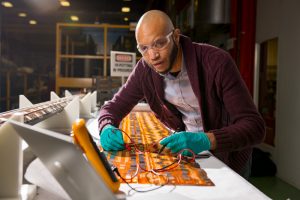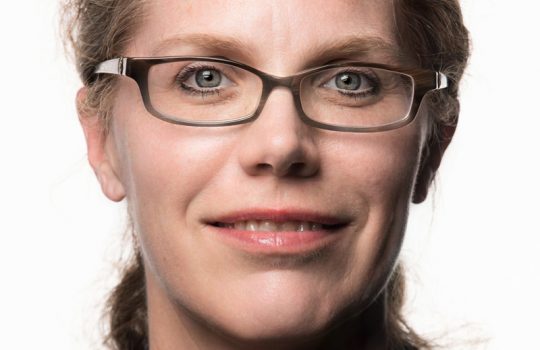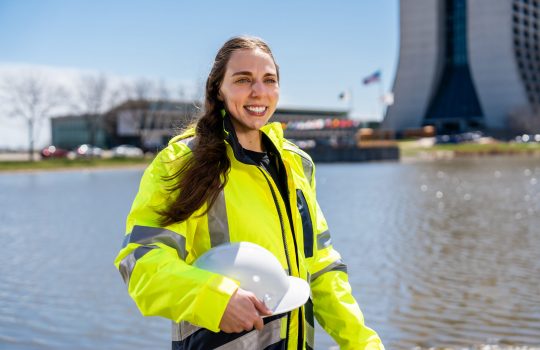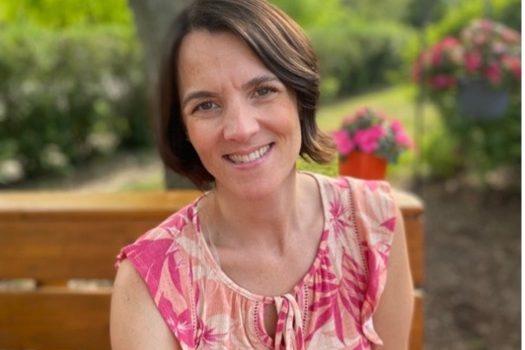
Marcellus Parker is the the floor supervisor of the technicians who make superconducting magnets for the High-Luminosity Accelerator Upgrade Program. Photo: Reidar Hahn
How long have you worked at Fermilab?
I started in accelerator systems and operations in 2014. In April 2018 I began working as an engineering physicist.
What do you do here?
I work with superconducting magnets. We make them supercold so we can pass current through them with little to no resistance, allowing us to make them even more powerful. I am one of the people who gets to coordinate some of this process.
I’m currently the floor supervisor of the technicians who make superconducting magnets for the High-Luminosity Accelerator Upgrade Program. CERN is trying to increase the magnetic field on the beam such that the luminosity of the Large Hadron Collider is greater for particle-to-particle collisions, so that we get a much larger response inside the detectors. The magnets guide where the particles go. It’s kind of like how in a waterslide, the walls guide you in a given direction. That’s what the magnets are doing.
What does a typical day look like for you?
Today I just finished making small samples of our magnets so that I can later test the electrical strength of the insulators that keep all the magnet turns separate from each other. Most days I find myself performing a series of tests on magnet coils soon to be used at CERN to gain an early idea of their performance before they become supercold.
You were a summer intern here in 2009. What advice do you have for Fermilab interns?
Learn all you can, and experience all you can manage to experience outside of the work. Your summer internship is both a chance to develop a professional portfolio and also experience some of the culture around where you work. I think working to take it all in makes for a much more eventful and satisfying summer. One of the things that made my summer internship at Fermilab such an exciting experience were things like the Undergraduate Lecture Series, attending some of the concerts that took place in the Ramsey Auditorium after hours, and overall just participating
What do you do with the National Society of Black Engineers (NSBE) and the Fermilab African-American/Black Association?
The NSBE is an organization that aims to increase the amount of Black representation of engineers. We’re starting to get involved with Fermilab now. Last October we had a conference where we got to talk to middle school and high school students about superconducting magnets and superconducting radio frequencies. It was nice to talk to these kids, show them how Fermilab can be and show them that we make really cool, high-powered devices that extend the boundaries of science on an everyday basis.
How do you approach the challenge of explaining these concepts?
Metaphors are the best way to do it. It’s like the waterslide. At the end of the day we’re all looking for some level of familiarity with whatever it is we’re talking about. Very often, things in quantum physics resemble everyday pieces of life. All we’re doing is putting some big words and math behind it. I just try to look for something that an everyday person can relate to and express it in that manner.
When you were younger, at what point did you get turned on to physics?
I think one of my earliest triggers for an appreciation in science happened on an airplane with my mom, who eloquently explained some of the cool inner workings of the flaps and why planes stay in the sky. She used a metaphor to explain it! For instance, the flaps she described were like a parachute behind the plane that slows it down. I found all this to be seemingly impossible giving how massive most commercial planes seem to be. Add a dash of Bill Nye, Popular Mechanics for Kids, The Magic School Bus, some K’Nex … and voila! You have an engineering physicist.
What’s something unique about you?
I find myself doing a lot of different hobbies. One minute I might decide to paint for hours, and later that same day may decide to go rock climbing. I also DJ on the side. I like house music and electronic dance music [EDM], and I like to mix hip-hop or old-school 90s bands into EDM. I try to be versatile with all of it.



